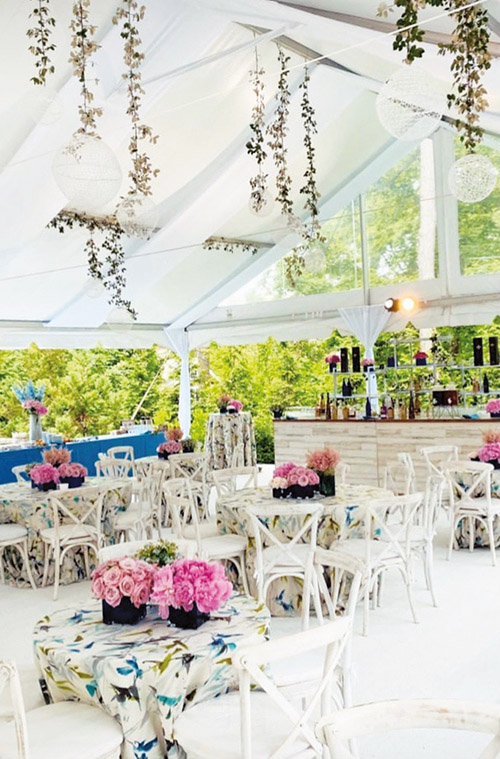

Next to the bride, the most beautiful visuals at a wedding are the flowers. And lovely as nature makes them, it’s the florist’s creativity and skill that turn flowers into eye-catching, breathtaking arrangements. That’s where Raphi Heimowitz, creative director of Papaya Events in Clifton, shines. Clients show him photos or describe what they’re looking for, and he interprets their vision, according to what flowers are available. “I ask for general inspiration and the ability to use my discretion to create something beautiful,” he said.
While flowers for tables and the chuppah are a must, brides are increasingly asking for elaborate, architectural floral installations at the bedekin. Heimowitz said the trend started at basement halls in Brooklyn, where there are few good backgrounds for photo shoots. “Now they are mainstream everywhere, even in the most beautiful venues.”
Creativity really comes into play when Heimowitz is faced with an unusual request. He recently provided arrangements for a bat mitzvah girl who was allergic to flowers by creating paper blossoms that coexisted happily with branches and greenery.
During the pandemic when the number of guests was limited, flowers took on an even greater role in making a simcha special, Heimowitz observed. “It was hard on brides. Their dreams went up in smoke. With so few guests, many spent even more on flowers to make the event memorable.”
Heimowitz used to make a sample arrangement for clients a month in advance of their event, but with the supply chain disruptions that are affecting every industry, he can’t guarantee he can produce the same design a month later. “Sometimes we spray flowers to alter the color, but aluminum has been held up and the paint manufacturers have no cans,” he explained as one example of disruptions in the supply chain for florists. A real nail biter occurs when a shortage of truck drivers causes a delay in shipping the flowers. Knowing what can happen, Heimowitz stays very organized and prepared to prevent any crisis that would mar the simcha.
Although restrictions on the number of guests have ended, Heimowitz said about 40% of his clients still want their simcha outside with tents. Venues with enough room started creating “tent mini cities” last spring and they are still being requested. It’s challenging to keep flowers moist and looking fresh with the heat that can build up in a tent. Dried flower arrangements have become an attractive way to beat the heat. Decorative items such as vases and candelabras add low maintenance glamour.
A degree in interior design led Heimowitz into the floral industry. Looking for a job, he walked into Atlas, one of the top florists in New York, and was hired. He stayed for six years, becoming the buyer responsible for purchasing a weekly list of flowers. He learned everything about choosing and caring for flowers and how to deal with vendors at the Manhattan flower market.
He took the plunge to open his own company when a good opportunity came along seven and a half years ago. “I was nervous. It was very different,” he recalled. “There was no salary and it’s a mix of quiet and busy seasons. But I had trust in Hashem. He gave me the gift of creativity.”
Heimowitz has a break during the three weeks until smachot heat up again in August. He has a word of advice for families in the throes of planning their big event. “Go easy on your florist. We wake up at the crack of dawn to get you fresh flowers.” And he has one small request: “We can always use a fresh coffee pick-me-up.”
By Bracha Schwartz









